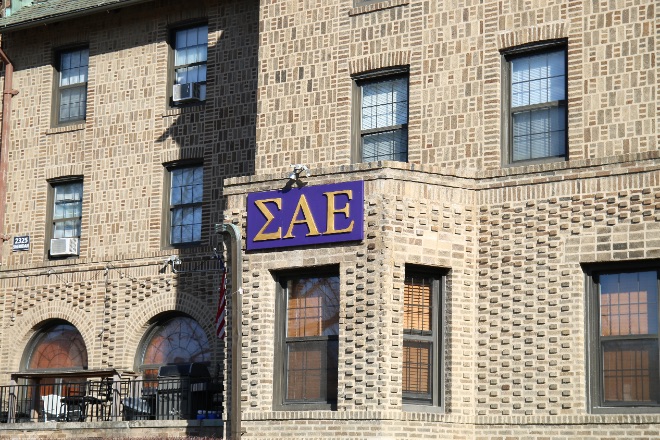
Last Friday, Sigma Alpha Epsilon fraternity (SAE) filed an appeal against their suspension, according to University spokesman Bob Rowley. Initially, members were instructed to move out by May 6 for violating a standing disciplinary probation. However, now members will be allowed to remain in the house until the end of the year if they comply with university standards and the terms of their probation, pending their appeal, Rowley said.
SAE’s suspension came as a result of the fraternity planning and hosting social events with alcohol, which violated the terms of a previous disciplinary probation. The suspension was unrelated to the earlier allegations of sexual assault and drugging this year; however, SAE national headquarters spokesman Brandon Weghorst confirmed that the fraternity still remains under a cease-and-desist order issued by the headquarters in February.
“Sigma Alpha Epsilon maintains stringent guidelines and expectations for our members, and those who do not comply with them are sanctioned accordingly,” Weghorst said in an email. “Furthermore, we have zero tolerance for actions or behaviors that deviate from our mission and creed, because that type of conduct is unacceptable.”
As a result, SAE’s future at Northwestern is uncertain. Here’s what their appeal process will look like, and where the fraternity might go from here.
How does the appeal process work?
Students or student organizations are allowed to appeal the result of a disciplinary hearing typically within 72 hours of receiving the original verdict. However, organizations can only do so if there was new information discovered relevant to their case, there were procedural errors during the hearing that resulted in unfair treatment or they can prove the sanctions outweighed the weight of information presented.
The appeal is not a rehearing of the original case, which means that the Office of Student Conduct will not rehear evidence on whether SAE hosted parties with alcohol and minors present. Rather, SAE’s appeal constitutes a written statement stating the fraternity's grounds and any new information it wishes to present, which the Panel will review and rule on accordingly.
Who makes the decision?
A special Appellate Panel will hand down their decision after reviewing the written appeal statements. Office of Student Conduct (OSC) Interim Director Jason McKean said that the panel is typically composed of senior-level faculty and staff from different academic units, someone from the Provost’s or Registrar’s office and a staff member who can provide a student affairs perspective. Appellate Panel officers are appointed by the Vice President of Student Affairs (Patricia Telles-Irvin) and trained annually by the OSC, according to page 112 of the student handbook.
The Panel will not meet with SAE or any other parties involved directly except in an extraordinary circumstance; however, they are allowed to discuss the appeal with special parties (such as a conduct administrator or the case investigator) to get clarification on or substantiate any information raised in the appeal.
The Appellate Panel may also review the full case beyond the written statements (although no new hearings will be conducted), and they will then determine whether any of the grounds for appeal are present in the case. If so, the Panel can either issue a new outcome or amend the original decision. If not, the Panel will uphold the original outcome from the disciplinary hearing.
After the appeal decision is handed down, is there any other way to request a case review?
McKean said that the Appellate Panel’s ruling would be final, and SAE therefore would not be able to request a further appeal if the original decision is upheld. However, McKean did point out that in extraordinary circumstances the Panel may refer the case back to the original Hearing Panel for further review and recommend that alternate policies or sanctions be considered. If the case is referred back, the Hearing Panel’s new decision will be considered final and there would be no way for SAE to appeal it a second time.
What happens next?
The Appellate Panel will review the information, meet to deliberate their decision and then write a letter detailing their decision and rationale. McKean said this process can take 1-2 weeks. The OSC purposefully does not set a time limit on appeal hearings in order to give the Panel enough time to adequately review the information in case the case is more complex. McKean did not know specifically when SAE’s appeal decision would be expected, as he is not directly involved in the fraternity’s case.
If the original decision is upheld, the sanction against SAE would be reenacted immediately and SAE members would theoretically be ordered to move out of their fraternity house. However, by the time the decision is handed down, the quarter will be almost over, and Rowley said SAE members would be allowed to remain in the house until the end of the year. While the appeal decision is pending, SAE is free to remain in its house and conduct operations as usual (while still following their national headquarters’ cease-and-desist order).
Vice President of Student Affairs Patricia Telles-Irvin declined to comment for this story beyond confirming University Spokesman Bob Rowley’s information. Neither SAE President Manos Proussaloglou nor Interfraternity Council President Rodney Orr could be reached for comment.
Editor's note: This story was updated on May 8 at 3:45 p.m. to clarify the time frame in which students or student groups are allowed to appeal the result of a disciplinary hearing.